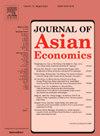Does household lifestyle impact the decarbonization effect of carbon generalized system of preferences? Evidence from household survey in China
IF 3.4
3区 经济学
Q1 ECONOMICS
引用次数: 0
Abstract
The household carbon emissions (HCEs) account for a large proportion of China’s overall carbon emissions. The Carbon Generalized System of Preferences (CGSP) plays a pivotal role in transforming household lifestyle, aiming at reducing HCEs. Previous research on the CGSP are limited to analysis its public acceptance, with less emphasis on analysis its mitigating effect on HCEs. Therefore, this study explores the mitigating effect of CGSP on HCEs and discover the underlying mechanism of household lifestyle by using the Double Machine Learning (DML) method. We further analyze the heterogeneous effects on different household income levels, urban and rural areas, and consumption categories. Our benchmark regression analysis demonstrates that CGSP effectively mitigates HCEs. After categorizing household lifestyle into household consumption upgrading (HCU) and household sustainable lifestyle (HSL), we find that the HCU negatively affects the relationship between CGSP and HCEs, whereas HSL enhance the effectiveness of reducing HCEs. The heterogeneity analysis results reveal that CGSP is more effective for households at the lowest, higher and highest income levels and has a stronger impact on carbon emissions for urban households compared to their rural counterparts. Additionally, the CGSP has heterogeneous mitigation effects across consumption categories, with significant impacts on food, residential utilities, facilities, transport and communication, recreation-education-culture, and other services. These findings provide quantitative insights into the implementation of CGSP in China.
家庭生活方式是否影响碳普遍偏好体系的脱碳效应?来自中国住户调查的证据
家庭碳排放(HCEs)占中国总碳排放的很大比例。碳普遍优惠制度(CGSP)在改变家庭生活方式方面发挥着关键作用,旨在减少hce。以往对CGSP的研究仅限于分析其公众接受度,较少分析其对hce的缓解作用。因此,本研究采用双机器学习(DML)方法,探讨了CGSP对hce的缓解作用,并揭示了家庭生活方式的潜在机制。我们进一步分析了不同家庭收入水平、城乡和消费类别的异质性效应。我们的基准回归分析表明,CGSP有效地减轻了hce。我们将家庭生活方式分为家庭消费升级(HCU)和家庭可持续生活方式(HSL),发现HCU对家庭消费升级与hce之间的关系有负向影响,而HSL对降低hce的效果有增强作用。异质性分析结果表明,相对于农村家庭,CGSP对最低、较高和最高收入水平的家庭更有效,对城市家庭碳排放的影响更大。此外,CGSP在不同的消费类别中具有异质性的缓解效应,对食品、住宅公用事业、设施、交通和通信、娱乐-教育-文化和其他服务产生重大影响。这些发现为中国CGSP的实施提供了定量的见解。
本文章由计算机程序翻译,如有差异,请以英文原文为准。
求助全文
约1分钟内获得全文
求助全文
来源期刊

Journal of Asian Economics
ECONOMICS-
CiteScore
4.70
自引率
9.40%
发文量
90
期刊介绍:
The Journal of Asian Economics provides a forum for publication of increasingly growing research in Asian economic studies and a unique forum for continental Asian economic studies with focus on (i) special studies in adaptive innovation paradigms in Asian economic regimes, (ii) studies relative to unique dimensions of Asian economic development paradigm, as they are investigated by researchers, (iii) comparative studies of development paradigms in other developing continents, Latin America and Africa, (iv) the emerging new pattern of comparative advantages between Asian countries and the United States and North America.
 求助内容:
求助内容: 应助结果提醒方式:
应助结果提醒方式:


